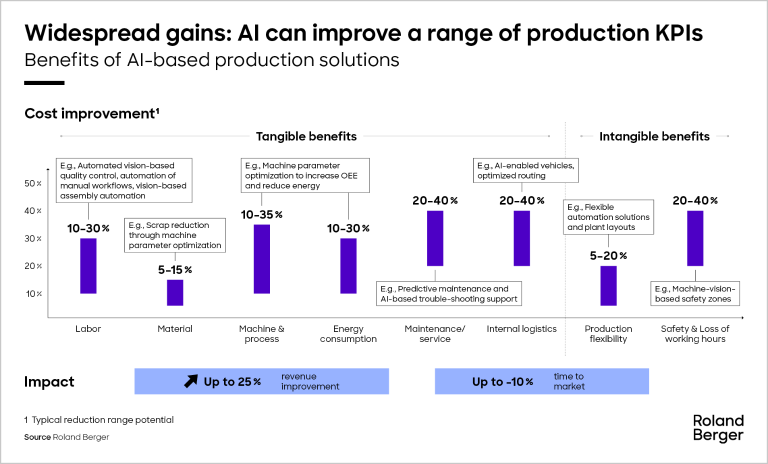Pharmaceutical companies face many challenges when designing their global manufacturing network. Roland Berger's 3-step approach ensures future competitiveness.


Why AI is a game changer for the pharmaceutical industry
By Michael Baur and Stephan Fath
Laying the right foundations to deploy AI at scale can improve the top and bottom line
AI’s ability to outperform humans in certain tasks can unlock significant value across the pharmaceutical value chain. When deployed correctly, it can improve both effectiveness and efficiency, bringing more powerful medicines to patients in a shorter timeframe.

In R&D, AI can add value in a variety of areas such as in-silico research, medical insights and wet-lab support. Already today, AI is helping to revolutionize drug discovery by generating better and more effective drug candidates, accelerating timelines from discovery to preclinical candidate stage by up to 50%.
"AI is already accelerating timelines from discovery to preclinical candidate stage by up to 50%."
However, organizations must consider numerous factors for AI implementation to be truly effective. Data availability is a well-known hurdle, while user capabilities and regulatory frameworks also need to be addressed.
Taking regulatory frameworks as an example: between 2020 and 2021, the use of AI components in submissions to the US Food and Drug Administration (FDA) increased tenfold. As a result, both the FDA and the European Medicines Agency have launched initiatives to provide guidelines for the use of AI in drug discovery. Understanding these guidelines and their future trajectory is vital for sustainable AI implementation as the technologies mature.
How pharma companies are using AI in R&D
Companies across the pharmaceutical sector are currently applying AI to varying levels in R&D. Some have invested in individual assets from AI companies such as Exscientia or Benevolent, who are actively developing proprietary pipelines by themselves as well as partnering with multiple pharma companies.
In some cases, pharmaceutical companies have worked with an AI specialist to develop a new platform to specialize in a particular disease or therapy model – see Roche and its subsidiary Genentech’s work with NVIDIA, for instance.
Lastly, some pharma players, such as Eli Lilly, have purchased AI services to improve specific R&D functionalities, investing in areas like AI-driven lab automation and medical reporting.
"AI will revolutionize each value chain step of pharmaceutical companies and provide substantial impact on top- and bottom-line."
Improving revenue and time to market
In operations and manufacturing, AI can bring efficiency gains beyond automation by unlocking value across the entire value chain. The latest developments in AI enable new use cases that can significantly improve a wide range of production KPIs, leading to improvements of up to 25% in revenue and up to 10% in time to market.
To do this, pharma companies are employing and tailoring AI tools from a broad number of industry-agnostic providers. Some of these providers focus on a specific step, such as Oracle on sourcing or Gatik on distribution. Meanwhile, other AI players offer solutions with cross-platform compatibility, such as AWS, which supports demand forecasting, condition monitoring and predictive maintenance as well as automated quality inspection.
For cross-platform solutions, organizations need to ensure data security and weigh up the potential risks of an integrated solution versus possible benefits.
Unparalleled commercial insights
In commercialization, AI tools can provide support in various aspects of regulatory and medical affairs as well as commercial functions.
The use of AI tools to directly aid interaction with healthcare professionals (HCPs) is increasing – rapidly providing medical information, for instance – but HCPs need thorough training for this to be most effective.
AI can deliver unparalleled insights into sales, marketing, and market access using market performance data. In turn, AI can also collect and predict market performance data.
AI players typically specialize in medical and regulatory affairs or commercialization. As a result, pharma companies either tend to acquire AI tools or services tailored to a specific business unit or task, or develop their own platform for company-wide rollout.
Overcoming challenges in AI integration
Integrating AI offers considerable potential for pharmaceutical companies to improve both the top and bottom line – and now is the time to act. Many industry players have already established successful use cases; creating operational guardrails and the right internal governance can now enable AI deployment at scale.
However, pharmaceutical companies should not overlook the fact that increasing regulatory pressure and the need to scale AI use cases is creating a complex set of challenges. As the industry’s use and benefits from AI continue to evolve, so will the hurdles in operating and continuously upgrading AI use cases at scale.
At Roland Berger, we offer a modular approach to address the needs of each company based on their AI maturity level. Our customizable solutions can help companies tailor their AI journey to maximize fit and impact.
We would like to thank Sophia Weerth for co-authoring this publication.
Register now to access the full publication, delve into how AI can transform efficiency and effectiveness in pharmaceuticals. Furthermore, you get regular news and updates directly in your inbox

_image_caption_none.png)









